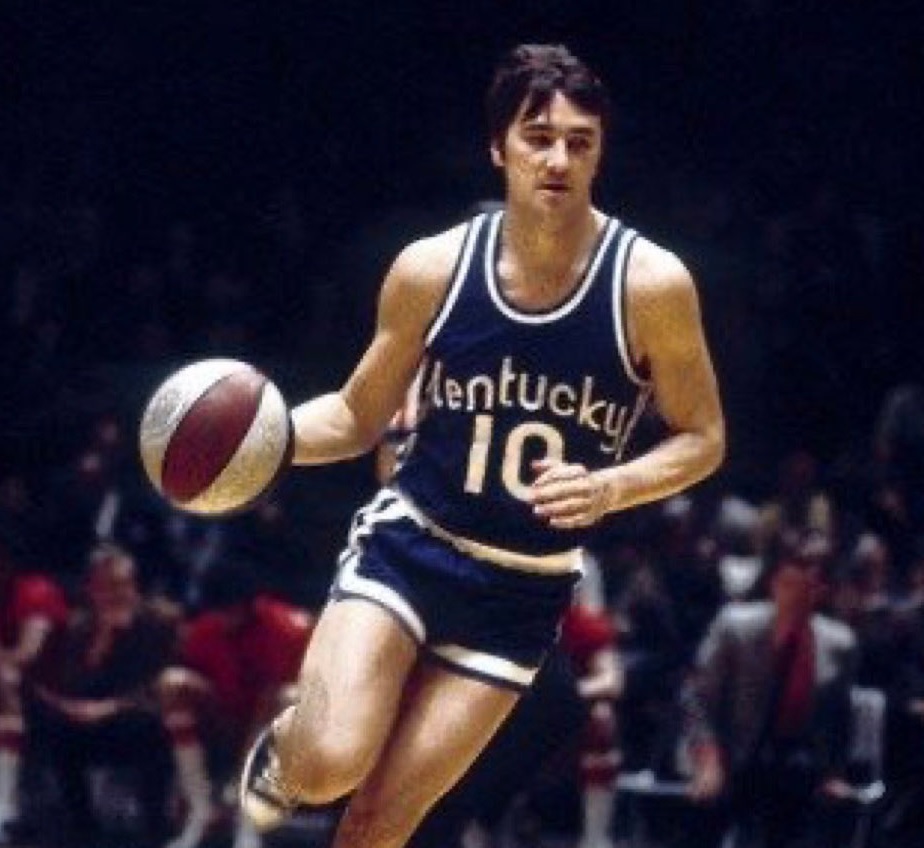Posted on
February 12, 2010 by
Marianne Bevis
The series “Pillars of Roger’s Career” looks back at key matches in the evolution of the mighty Roger Federer.
It was early in the new millennium and it had a special feel: of worlds colliding, of a changing of the guard, of one era giving way to another.
Pete Sampras, the dominant player of the 1990s, was flexing his muscles and his reputation for one more assault on the record books.
Another Wimbledon title would make him the most prolific winner of singles titles at the most prestigious of tennis events. One more Wimbledon victory and he would step above William Renshaw, with whom he shared the record of seven.
But it was more than that. Sampras had taken the last decade of the 20th century by the throat from the moment he won his first Grand Slam at the U.S. Open in 1990 until his most recent victory at this very tournament in 2000.
He was the title holder. He had lost only one match on Wimbledon’s grass—his quarterfinal against Richard Krajicek in 1996—since reaching the semi-finals in 1992. That’s 53 wins in the last 54 matches.
He was the first since Rod Laver to have a legitimate claim to the “Greatest of all Time” accolade, and this could be one more nail in the coffin of that “GOAT” debate.
Stood on the opposite side of the court was a mere teenager, newly in the top 20, and the first time he’d been seeded in a Slam. Sure, he’d won the junior title in 1998, but he’d gone out in the first round in both years since.
But this had a special feel. Read the rest of this entry →
Tags: Men's TennisPete SamprasRoger FedererTennis
Category
Federer's Pillar Matches, Great Moments, Sports History, Tennis
Posted on
February 03, 2010 by
Marianne Bevis
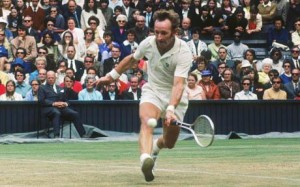
Rod Laver was the greatest tennis player of his era and some believe the best of all-time.
A new series for a new year, and this time we take a look at the men who have left an indelible mark on tennis. This companion piece to ‘Queens of the Court’ begins with possibly the greatest of the ‘Great Men of Tennis.’
It is the name that—eventually—no one argues about. In the debate about which man is the greatest of all time, Rod Laver is invariably the yardstick.
Even those who never saw him play, who have only heard tell of his achievements, bracket him with Pete Sampras and Roger Federer, with Don Budge and Pancho Gonzalez, with Bill Tilden and Jack Kramer.
Were it not for the five-year hiatus before the arrival of the Open era, most believe that Laver would have put the big “GOAT” question beyond argument. For if he had remained an amateur and so been allowed to play in the 21 Grand Slams between 1963 and the Australian Open in January 1968, who knows what Slam target Federer might yet have to reach?
In the years either side of that five-year “black hole,” Laver notched up 11 singles titles. He was in his prime, reaching his full potential. Read the rest of this entry →
Tags: Great Men of TennisMen's TennisRod Laver
Category
General, Great Men of Tennis, Sports History, Tennis
Posted on
January 19, 2010 by
JA Allen

Nikolay Davydenko will look to move past the traditional men's tennis powerhouses in Melbourne.
Parity has found its way into men’s tennis. In terms of pure talent and potential, the field at the Australian Open seems wide open.
Oddsmakers, of course, factor in experience and past performance—but in Australia, in the land of sunnies and amber fluid anything is possible.
As we unveil our preseason power rankings consider the ramifications of the next two weeks upon the state of men’s tennis as the first grand slam of 2010 gets underway.
The Top 10
1. Nikolay Davydenko (Last Power Ranking: 1; ATP Ranking: 6)
Last Four Tournaments: Qatar [Winner], London [Winner], Paris [R16], Valencia [Semifinalist].
Power Ranking Points: 316
Everyone is curious. Has the wiry Russian changed his diet, his training regimen, or his racket? All of a sudden he has become, if not everybody’s choice to win the Australian Open—at least everybody’s dark horse. At age 28, Davydenko appears to be playing his very best tennis.
As the Australian Open gets underway, many expect Russia’s “Invisible Man” to become “Mr. Invincibility,” taking this title to win his first major. His quickness makes Davydenko dangerous on the hard courts. He is in Federer’s quarter so there may be a potential matchup.
If so, can Davydenko win three in a row over the man he had never defeated until the ATP World Tour Finals when the Russian took out Federer in the semis? He followed that in Doha with a semifinal victory again over Federer and a win over Nadal in the finals. Davydenko is hot, hot, hot!! Read the rest of this entry →
Tags: Men's TennisPower Rankings
Category
Australian Open, Tennis
Posted on
January 18, 2010 by
Rob York
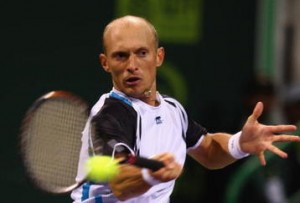
Nikolay Davydenko could be a factor in the 2010 Australian Open.
Nikolay Davydenko has been regarded with a mixture of awe and sympathy for many years.
He announced himself as a factor in the 2005 Australian Open, after causing a minor, yet noticeable jolt to the draw by pounding Tim Henman and Guillermo Cañas in succession. In the quarters of that event, he faced Andy Roddick, who was then No. 2 in the world.
Even then it was hard not be amazed at his shots: Time and time again he spun in his first serves, rarely winning points outright with them, but forcing Roddick to cough up a ball landing at midcourt which the Russian could crush. And that’s what he did, sending a host of forehand winners past the American.
Victory was not to be his that day, as Roddick was holding serve easily, and his returns eventually started landing deep enough to prolong the rallies, which eventually contributed to mistakes on the Russian’s side. Though he lost in straight sets that day, Davydenko announced that he was one of the best pure ballstrikers in the world.
And that pure hitting allowed him to reach the top 10 that year, and stay in the top 10 ever since. In an era where the players are ever bigger and more imposing, Davydenko is 5’10” – the only man under 6 feet in the current top 10 – and perhaps generously listed at 154 pounds by the ATP Tour website. What’s more, his thinning tufts of blond hair have always reminded of a freshly hatched chick. Read the rest of this entry →
Tags: Australian OpenMen's TennisNikolay Davydenko
Category
Australian Open, Tennis
Posted on
January 11, 2010 by
Rob York
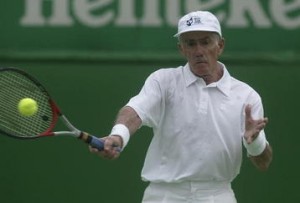
Ken Rosewall is still active as a tennis legend.In looking back at the great players of the past, I often can’t help but wonder how they’d perform in the modern game.
It might not have been as lucrative to be a pro tennis player in Ken Rosewall’s day, but there were other advantages.
For though it was a physically demanding sport even then, one didn’t necessarily have to be over six feet tall and ripped. While the modern men’s game has had only two major champions—the single slam winners Michael Chang and Gaston Gaudio—under 5’10”, Rosewall was actually under today’s average international height for males at 5’7″.
And while fitness has long been demanded of its players, Rosewall played in a day when a build like Rafael Nadal’s was unthinkable. Rosewall, actually, would acquire the nickname “Muscles” on the tennis court, but it was ironic moniker: The 145-pound Australian was given the name because muscles were something he didn’t have in abundance.
But Nadal and Rosewall do share kinship in one respect: The close relatives who taught them how to play the game instructed them to do so with their non-dominant arm. Toni Nadal’s decision to teach his nephew to play lefty has proven beneficial, as many a right-handed opponent has struggled to retrieve his high-bouncing shots to their backhands.
It’s a bit harder, though, to see how it benefited Ken Rosewall when his father, an avid player and tennis court owner, insisted that his son play right-handed. Perhaps there was no precedent for left-handed tennis greats in those days; all that is known is that, playing right-handed, Rosewall’s worst shots would be his forehand and serve.a Read the rest of this entry →
Tags: Ken RosewallMen's Tennis
Category
Tennis
Posted on
December 19, 2009 by
Rajat Jain
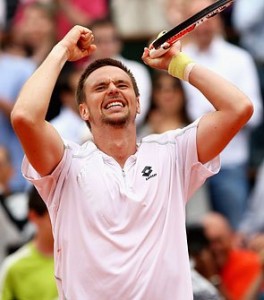
Soderling's victory over Nadal is considered as the biggest upset in the history of Roland Garros
One of the (dis)advantages of being a software junkie is I like to come up with weird geeky nicknames without any context, and those are not taken particularly well, especially with the fairer sex. This disappointment is usually covered up by the amusing happiness I get by basking in my own glory of false intelligence.
Robin Soderling was assigned a similar nickname when he created the greatest upset in the history of Roland Garros — BSOD — an acronym for “Blue Screen of Death ” which we often get while using a Windows Operating System. Soderling became famous after this historic match and his career has steadily progressed after this tournament, rather than being lost after a one off, which further justifies the nomenclature.
Things were not the same for this Swede, though, till he met Nadal at Phillip Chatrier.
Unlike his precedents, he does not possess the ice cool demeanor of Bjorn Borg, the adaptability of Mats Wilander, the elegance of Stefan Edberg, or the raw, but underutilized, talent of Thomas Enquist. And there is only so much that you can achieve with a big serve and a massive ugly forehand which works best only in normalized conditions under a roof.
Yet, mentally stronger people have fought and achieved much better results with even lesser talent that what Soderling had achieved till May this year.
Read the rest of this entry →
Tags: Men's TennisRobin SoderlingTennis
Category
General, Tennis






